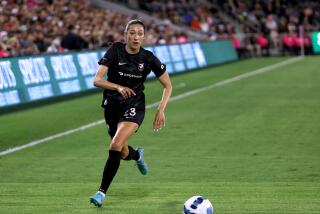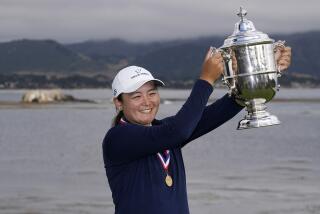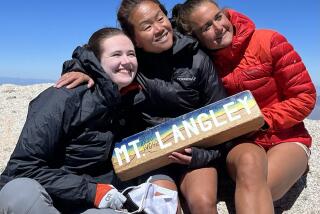A Return to the Fast Track
- Share via
This is when golf gets fun, when Helen Alfredsson starts feeling good about her game again.
The native of Sweden has climbed back up the rankings after a string of Top-10 finishes late last year.
“I still have a bit to go,” she said. “But obviously I’m playing pretty well.”
Just two weeks ago, she won the $600,000 Office Depot tournament in West Palm Beach, Fla., which got her phone ringing.
“I’ve gotten so many calls,” she said. “From all my friends, from everywhere.”
Alfredsson plays in the Los Angeles Women’s Championship, just a few minutes down the freeway from La Canada Flintridge, where she makes her home much of the year. The other players in the tough field know that she has to be considered a threat.
“She’s a great player,” said Emilee Klein, a rising LPGA star. “She’s one of those who is going to win.”
They know how tough Alfredsson can be--just as long as she keeps herself away from dragsters, fighter jets and 10-speed bicycles for the next few days.
In a sport known for its quiet and reserve, Alfredsson is a certified whirlwind, the LPGA’s answer to the X Games. This is a 32-year-old woman who apparently never met an emotion or a life-threatening situation she did not rush toward.
When she is not swearing at her putter in Swedish, she is riding a Harley-Davidson or finding time in her busy tournament schedule to race dragsters and go flying with the Blue Angels.
“The only thing that bothered me was that during the briefing they kept saying, ‘If you need to leave the aircraft . . . ‘ “ Alfredsson recently told Golf Digest. “I kept saying, ‘I don’t have any plans to leave the aircraft.’ ”
Her fiance, Leo Cuellar, teases her about being a tomboy.
“She’s very aggressive, living every minute to the fullest,” said Cuellar, soccer coach at Cal State Los Angeles who played in the World Cup for Mexico. “I give her a hard time because she’s fulfilled a lot of boys’ dreams.”
Tall and lanky, with a toothy grin, Alfredsson talks of her childhood in Goteborg, of running track and playing squash and team handball.
“I was doing everything,” she said.
Her hunger did not dissipate, even as she became a top golfer, winning Sweden’s national championship six times in an eight-year span during the 1980s.
Cuellar suggests thrill-seeking is crucial to her success.
“Trying new things helps her self-confidence,” he said.
But the extreme aspect of her personality has not always served Alfredsson well.
She burst onto the LPGA Tour by winning the rookie of the year award in 1992. The following year, she won the Dinah Shore, one of the tour’s four major championships.
Yet, from the very beginning, there were questions about her emotions. Anger and frustration showed in her body language on the course. She would chastise her clubs and herself.
Tour veterans suggested a poker face. She responded: “It’s just my style. I like to live the game.”
Said Cuellar, who has been her caddie on occasion: “She can be very high and happy one moment, then down and depressed.”
Those emotions surfaced more and more as time went by. There were some top-10 finishes and a few victories overseas, but not enough to satisfy the expectations raised by her auspicious LPGA debut.
“I was unable to live up to them,” she said. “You butcher your confidence for three years . . . Oh God yes, it gets tough.”
And there was something else: nagging physical problems that seemed to worsen each year. She would get neck spasms just from washing her hair. She could never get comfortable addressing the ball.
“Through that period, she knew that her swing was not holding at the key moments,” Cuellar said. “Emotionally and physically, she was going down for a good period of time.”
Visits to numerous doctors produced no relief. They could find nothing wrong.
“There were days I had to roll out of bed because I didn’t have the strength to lift my leg,” she said. “When you’re eating eight Advils a day, you know it’s bad.”
Finally, Alfredsson asked a friend’s father, a radiologist, to perform one more set of X-rays. He discovered her right hamstring had become unattached at a point where her pelvic bone was chipped.
“In golf, you do everything with hip flex,” she said. “I had no muscles to wind up. My right side was basically dead.”
When she got the news, Alfredsson knew precisely what had happened. In 1985, while attending United States International University in San Diego, she was in a bicycle accident.
“I was going downhill and the brakes locked on me and I flew off,” she said.
Alfredsson recalls walking around, not knowing where she was. “I woke up in a police car and they were asking me what my name was,” she said. “I had no idea.”
Her head soon cleared and it seemed that she had escaped otherwise unscathed. Only after her hip problem was diagnosed did it become apparent that the problem had lingered for a decade.
The muscle was reattached during surgery in November, 1996. Alfredsson remained in bed for five weeks but, despite medical advice to continue resting, could not keep herself still any longer.
By February, she was learning drag racing in Pomona. She was also entered in the inaugural Los Angeles Women’s Championship.
Predictably, she missed the cut. But, for the first time in a long time, there was a light at the end of the tunnel.
“Even in the beginning, I knew it was going to be a long road,” she said. “At least I had some idea where I was heading.”
Her form returned, slowly but surely. The injury was undetected for so long that Alfredsson had to remind herself to walk without dragging her right side. She had to relearn much of the game she had played since youth.
“The only way you can get your confidence back is to play well and keep hitting shots,” she said.
Last August, she had a breakthrough victory at the Scottish Open. Then came a playoff loss to Juli Inkster at the $525,000 World Championship of Women’s Golf in Seoul, South Korea, and a victory at the $480,000 Itoen Open in Chosei, Japan.
In a way, the bad times were paying off. She felt tougher for all that she had been through. Cuellar saw it too.
“The level of maturity was evident because her emotions were more in control,” he said.
So will the LPGA see a cooler, more reserved Alfredsson this year? Not likely.
“That’s not her personality,” Cuellar said. “Nothing will stop her.”
After all, Alfredsson is feeling good about her game again. She is glad to be a favorite at Oakmont this week.
“It’s nice that people have expectations because they believe you can do it,” she said.
More to Read
Go beyond the scoreboard
Get the latest on L.A.'s teams in the daily Sports Report newsletter.
You may occasionally receive promotional content from the Los Angeles Times.











